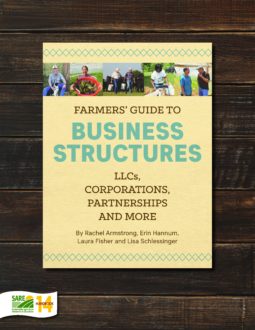This section explores significant aspects of the C corporation, how the entity is formed and what needs to be done to maintain it. The following section, Going Deeper into C Corporations, gives you some tools to help you navigate the process of creating and operating a C corporation; it includes a checklist for creating a C corporation as well as sample bylaws and annual meeting minutes with explanations.
The C corporation is the ordinary, traditional corporation. Most know it as just “corporation.” Nowadays the letter “C” is often included as a prefix to prevent confusion, as there’s been a recent rise of new corporate forms such as the S corporation federal tax status (where the “S” stands for small) and the B corporation (where the “B” stands for benefit).
| At-A-Glance Chart: C Corporation | ||
|---|---|---|
| C Corporation Terminology | General Concept | Terminology |
| Name | “Farm Name, Inc” | |
| Owners/investors are called | “Shareholders” or “Stockholders” | |
| Persons who make management decisions are called | The “Board of Directors” is responsible for making key decisions; the “Officers” are responsible for the day-to-day management. | |
| Creation document is called | “Articles of Incorporation” | |
| Organizing document is called | “Bylaws” | |
| An owner’s investment in the company is called | “Equity Investment” | |
| An ownership share is called | “Shareholder Equity” or “Shares” | |
| A payment of the company’s profits to the owners is called | “Dividend” | |
| Is there personal liability? | Limited to a shareholder’s investment | |
| How many participants can you have? | One or more, unless elect S corporation tax status | |
| Are annual meeting required? | Required | |
| Are different shareholder classes allowed? | Allowed, unless elect S corporation tax status | |
| Is an EIN necessary? | Required | |
| Who files the tax return? | Entity files an income tax return and pays corporate taxes; individuals also pay taxes on any dividends they receive from the corporation. Option to elect S corporation federal tax status | |
| C Corporation with S Corporation Federal Tax Status | How many participants can you have? | Maximum 100 persons; all must be U.S. citizens and all must be human beings, estates, tax exempt entities, or certain qualified trusts |
| Are different shareholder classes allowed? | Not allowed | |
| Who files the tax return? | Pass-through, but entity must file informational Form 1120S with the IRS, distribute Schedule K-1 to each owner and file all Schedule K-1s with the IRS | |
